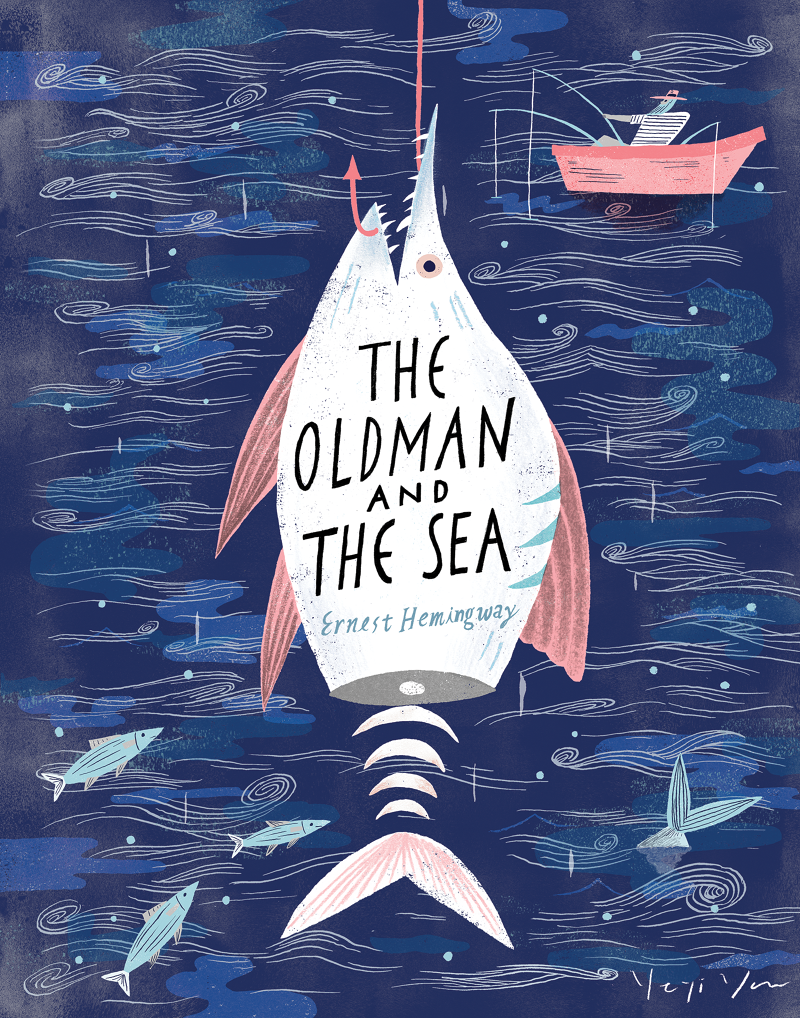The Old Man and the Sea (Ernest Hemingway)

What makes humans so special? What
makes us stand on top of every other species and renovate the plant more palatable to us? The answer is, nothing. Although
we are just one of a myriad of species constituting the world, we tend to forget
and act as preeminent beings. Ernest Hemingway portrays the humbleness humans
should equip through an old man fighting his way within nature.
Santiago,
the old man, is a veteran fisherman in an unlucky streak. Although he has an
apprentice that looks up to him and secures his side, his pride compels him to
go further to catch a big fish and redeem his position. Fortunately, he meets
his prey in short notice. However it didn’t take long to figure out that the
fish tugging the line wasn’t some mediocre creature but an opponent worthy to
give all he had. For three days did the fight continue and the pain from his
back, severed palm, and nausea assailed him. But in the end the marlin was
caught and being astonished by the size and appearance of it, Santiago pays
respect towards the noble creature. Satisfied, he sails his way back but
confronts obstacles; several waves of shark attacks threaten the marlin.
Despite the desperate fight Santiago had put up, the fish is ripped apart every
wave and only the skeleton and the bill are all that remained when he reached
the shore. The old man is exhausted. He returns to his shack and sleeps,
dreaming about the lions.
What
I loved the most in this book was the concise but elegant descriptions of the
sailing journey. I could imagine myself crouching on a wooden vessel, feeling
the tautened line through my sweating fingers. The raw sashimi, salty seawater,
and coppery blood the old man tasted was as if flowing inside my mouth as well.
Moreover, the stream of consciousness the old man starts to develop was
fascinating. The series of soliloquy is lead through a train of random topics followed
one after another which enables the reader to sympathize deeper with the poor
man. Throughout the book, I was the old man, steering the skiff to the vast profound.
There
are two main themes Hemingway conveys through the novella: human’s place within
nature and the search to earn dignity. Floating in the open sea, Santiago is
merely another creature that inevitably follows the law of nature: to kill or
to be killed. He realizes this harsh but simple law by observing the hawk
trailing a small warbler, and he readily admits that he is also a subject to
nature. But because things are so, he soon realizes the beauty in struggling to
refuse death. His principle is shown clearly in the quote “But man is not made
for defeat. A man can be destroyed but not defeated.” Both the old man and the
marlin is desperately struggling to live, burning every strength and pride within,
and the fight is noble in itself. Santiago develops deep respect to his
opponent and enjoys the life-and-death struggle: “Never have I seen a greater,
or more beautiful, or a calmer or more noble thing than you, brother. Come on
and kill me. I do not care who kills who.”
And
because the battle was of honor and sublimity, even after the sharks wipe out
the old man’s trophy, he remains dignified. Yes, he is wretched and enervated
but the unwavering determination to fight is what kept him proud. As his
principle, he is destroyed but never defeated. After some rest he will return
to the open, honored and solid as always.
[ Quotes ]
“But man is
not made for defeat. A man can be destroyed but not defeated.”
“With his mouth
shut and his tail straight up and down we sail like brothers. Then his head
started to become a little unclear and he though, is he bringing me in or am I
bringing him in?...But they were sailing together lashed side by side and the
old man thought, let him bring me in if it pleases him.”
“Every day is a new day. It is better to be lucky. But I rather be exact. Then when luck comes you are ready.”
“Luck is a thing that comes in many forms and who can recognize her?”

댓글
댓글 쓰기